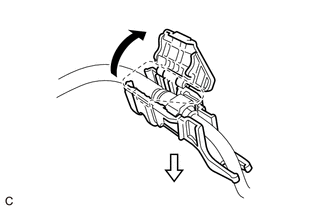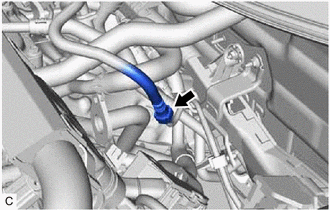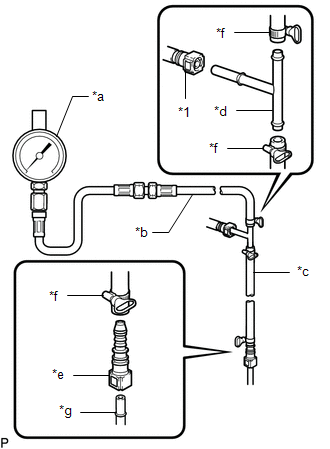| Last Modified: 07-31-2024 | 6.11:8.1.0 | Doc ID: RM100000001GNK8 |
| Model Year Start: 2020 | Model: Corolla | Prod Date Range: [01/2019 - 09/2022] |
| Title: 2ZR-FXE (FUEL): FUEL SYSTEM: ON-VEHICLE INSPECTION; 2020 - 2022 MY Corolla Corolla HV [01/2019 - 09/2022] | ||
ON-VEHICLE INSPECTION
PROCEDURE
1. CHECK FUEL PUMP OPERATION AND INSPECT FOR FUEL LEAK
(a) Check fuel pump operation.
(1) Connect the Techstream to the DLC3.
(2) Turn the power switch on (IG).
NOTICE:
Do not start the engine.
(3) Turn the Techstream on.
(4) Enter the following menus: Powertrain / Engine / Active Test / Activate the Circuit Relay.
Powertrain > Engine > Active Test
|
Tester Display |
|---|
|
Activate the Circuit Relay |
(5) Check for pressure in the fuel tube sub-assembly from the fuel line. Check that sounds of fuel flowing from the fuel tank assembly can be heard. If no sounds can be heard, check the relay, fuel pump, ECM and wiring connectors.
(b) Inspect for fuel leaks.
(1) Check that there are no fuel leaks from the fuel system after doing any maintenance or repairs. If there is a fuel leak, repair or replace parts as necessary.
(c) Turn the power switch off.
(d) Disconnect the Techstream from the DLC3.
2. CHECK FUEL PRESSURE
(a) Discharge fuel system pressure.
(b) Measure the auxiliary battery voltage.
Standard Voltage:
11 to 14 V
(c) Open the cover of the No. 1 fuel pipe clamp and remove the No. 1 fuel pipe clamp from the fuel tube connector.


|
Open |

|
Pull |
|
(d) Disconnect the fuel tube sub-assembly from the fuel pipe. |
|
|
(e) Install SST (EFI fuel pressure gauge) as shown in the illustration. SST: 09268-00010 09268-00020 09268-00030 SST: 09268-45101 09268-41260 09268-41280 09268-41700 95336-08070 |
|
(f) Wipe up any spilled fuel.
(g) Connect the cable to the negative (-) auxiliary battery terminal.
NOTICE:
When disconnecting the cable, some systems need to be initialized after the cable is reconnected.
(h) Connect the Techstream to the DLC3.
(i) Turn the power switch on (IG).
NOTICE:
Do not start the engine.
(j) Turn the Techstream on.
(k) Enter the following menus: Powertrain / Engine / Active Test / Activate the Circuit Relay.
Powertrain > Engine > Active Test
|
Tester Display |
|---|
|
Activate the Circuit Relay |
(l) Measure the fuel pressure.
Standard Fuel Pressure:
304 to 343 kPa (3.1 to 3.5 kgf/cm2, 44 to 50 psi)
- If the fuel pressure is more than the standard, replace the fuel pressure regulator assembly.
- If the fuel pressure is less than the standard, check the fuel hoses and their connections, fuel pump and fuel pressure regulator assembly.
(m) Put the engine in Inspection Mode (Maintenance Mode).
Powertrain > Hybrid Control > Utility
|
Tester Display |
|---|
|
Inspection Mode |
(n) Start the engine.
(o) Measure the fuel pressure at idle.
Standard Fuel Pressure:
304 to 343 kPa (3.1 to 3.5 kgf/cm2, 44 to 50 psi)
HINT:
Refer to Standard Idle Speed.
(p) Disconnect the Techstream from the DLC3.
(q) Stop the engine.
(r) Check that the fuel pressure remains as specified for 5 minutes.
Standard Fuel Pressure:
147 kPa (1.5 kgf/cm2, 21 psi) or more
If the result is not as specified, check the fuel pump, fuel pressure regulator assembly and/or fuel injector assemblies.
(s) After checking the fuel pressure, disconnect the cable from the negative (-) auxiliary battery terminal and carefully remove SST to prevent fuel from spraying.
NOTICE:
When disconnecting the cable, some systems need to be initialized after the cable is reconnected.
(t) Connect the fuel tube sub-assembly to the fuel pipe.
(u) Install the No. 1 fuel pipe clamp to the fuel tube connector and close the cover of the No. 1 fuel pipe clamp.
(v) Connect the cable to the negative (-) battery terminal.
NOTICE:
When disconnecting the cable, some systems need to be initialized after the cable is reconnected.
(w) Inspect for fuel leaks.
|
|
|
![2020 MY Corolla Corolla HV [01/2019 - 04/2020]; 2ZR-FXE (FUEL): FUEL SYSTEM: PRECAUTION](/t3Portal/stylegraphics/info.gif)

